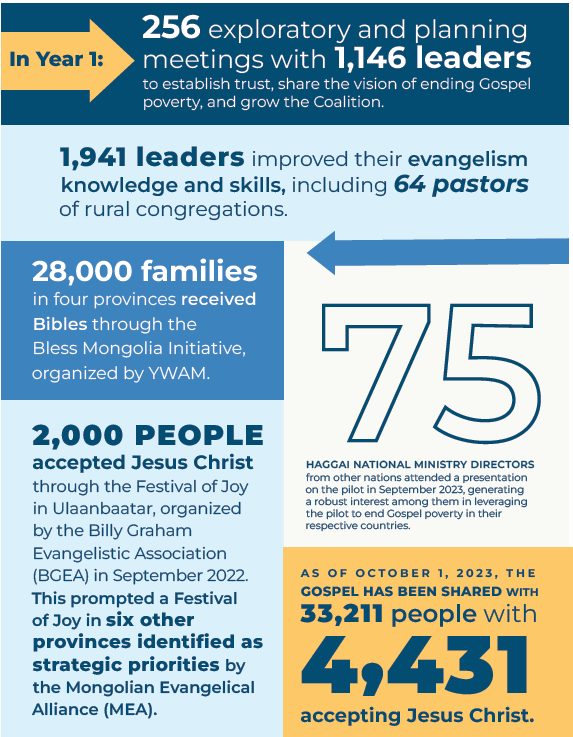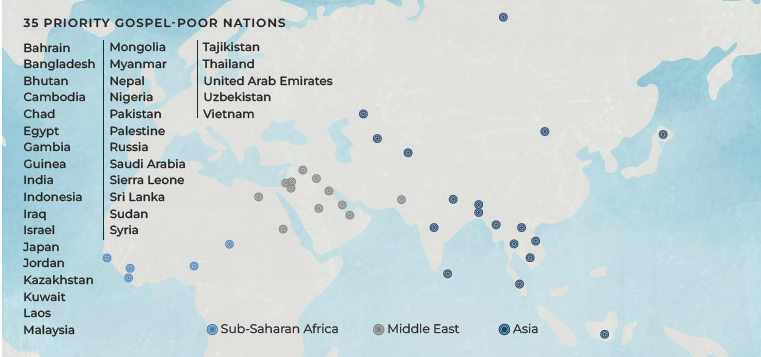MONGOLIA PILOT PROJECT
A Unity of Purpose
Our vision is “every nation redeemed and transformed with the Gospel of Jesus Christ.” In 2018 we began to dream of a project in a specific nation that would accelerate the work of the Gospel across the population so that everyone could experience Jesus.
In support of that goal, a business plan was written to Accelerate Ending Gospel Poverty in This Generation. The business plan recommended an unprecedented approach in the Gospel arena of implementing a holistic, collaborative, unified approach involving all churches and ministry organizations who would come together to create and then implement a plan. You can read more about this business plan and course of action in this pages articles that follow.
In 2019, Haggai decided to pilot an initiative in Mongolia — the Accelerate Ending Gospel Poverty Initiative. Why Mongolia, compared to other countries that need the Gospel? Neighbored by global superpowers China and Russia, Mongolia is one of the most Gospel-poor countries in the world, with 51% of its 3.4 million population having never heard or responded to the Gospel. It is a difficult place for Western missionaries to reach both from a travel perspective and culturally, with 21 unique provinces speaking several different linguistic dialects and their nomadic lifestyles spread across miles and miles of rolling landscape.
Today, only 2% of the population are Christians, most of whom are first-generation believers. However, we have found that Mongolians are eager for truth in ways that are in stark contrast to many post-truth nations living in similar Gospel-poor conditions. A passion exists to share the gift of the Gospel with everyone in their nation!
We knew influential leadership would be required to convene the various local churches and ministry organizations to create a unifying vision, and it would require the support and participation of our own national ministry, Haggai Mongolia. We appointed two, well respected Haggai leaders as executive director and deputy director, Drs. Amarsaikhan Bazar and Zolzaya Baljinnyam.
Participating in this pilot program are ministries that meet physical, educational, and spiritual needs, such as Youth With a Mission (YWAM), Campus Crusade for Christ International (Cru), the Billy Graham Evangelical Association (BGEA), Mongolia V.E.TNet (VetNet), Awana, and the International Bible League.
An important organization participating as a catalyst in creating a unifying vision among churches and the various ministry organizations toward ending Gospel poverty in their nation is the Mongolian Evangelical Alliance. When there is a unity of purpose at the local level, it becomes an effective way to coordinate efforts and catalyze greater impact. It is a coalition of the willing!
I was able to travel to Mongolia in April of 2022 with my husband, Bill, to see firsthand how the initiative’s efforts have unfolded. We experienced a renewed vision and energy among Christian leaders as they shared with us what all they are doing, and we heard many stories of the individuals who have said “yes!” to Jesus. We visited a new, small church where an 85-year-old woman told us that she had prayed for God to provide a church for the last ten years. Many more churches are needed for those who have become believers in the last two years.
Bill remarked that Isaiah 43:19 kept coming to mind: “See, I am doing a new thing! Now it springs up, do you not see it? I am making a way in the wilderness and streams in the wasteland.” During our trip, this verse came alive as we saw God at work in mighty ways. We’re grateful to be a part of this pilot and the wider initiative and delighted to share the fruits of it with you in the pages that follow. Ending Gospel poverty is a God-sized mission, but we know through wisdom, strategy, and the work of the Holy Spirit, it is possible!
Pray with us for this great nation!
The Business Plan
As mentioned in CEO Dr. Bev Williams’ article, while there are likely many ways to approach a solution to end Gospel poverty, Haggai International began the Accelerate Ending Gospel Poverty Initiative that takes a business case approach. Constructing a business case helps ensure that rigorous thought, analysis, and prayer are applied to addressing the opportunities at hand, strategically applying resources, and implementing a phased approach to ensure success. The business case has been constructed in the manner illustrated below.
The Accelerate Ending Gospel Poverty Initiative is built on two recommendations listed with their details as follows.
RECOMMENDATION 1
Implement a holistic, unified approach to accelerate ending Gospel poverty.
There are 4 key elements of this recommendation: 1) establishing a unifying vision 2) engaging collaborating ministries from every ministry area, 3) defining Kingdom flourishing goals, and 4) employing 12 Key Success Attributes.
1. The UNIFYING VISION is to end Gospel poverty in a specific nation or region of a nation.
2. COLLABORATING MINISTRIES are those serving in the name of Jesus and ministering in the following areas:
- Evangelism — ministry that advances the Gospel of Jesus Christ, including church planting, Scripture translation and distribution, and engagement.
- Growth — ministry that encourages individuals to grow in the depth of their character, personal abilities, and spiritual focus while promoting education, spiritual development, counseling, and job training.
- Poverty — ministry that helps alleviate physical suffering through emergency aid, community development, healthcare, food distribution, and other activities aimed at helping the poor access necessities.
- Culture — ministry that accentuates the “society connected” aspects of life, including art creation, public policy, media, historical preservation, and initiatives that lead to the flourishing of society in God-honoring ways.
- Justice — ministry that advocates for the freedom of individuals enduring slavery, martyrdom, persecution, human trafficking, lack of religious freedom, and ending all forms of injustice and oppression.
- Support — ministry that informs, facilitates, and accelerates Kingdom-building endeavors, including prayer, generosity, stewardship, mapping, and other services that support Christian work.
- Church — ministry that supports the local and international Church so that it can effectively minister to its members and the broader community.
3. KINGDOM-FLOURISHING GOALS are specific goals developed based upon physical needs met; individuals living in healthy relationship with others; expressing generosity toward one another; having God’s Word to guide us; being free from sin, corruption, slavery, and persecution; worshiping God individually and corporately; and everyone having heard the Gospel. Collaborative ministries chosen by on-the-ground nationals for this initiative fit one or more of these areas.
4. During our research for this business plan, we discovered 12 ATTRIBUTES evident in successful initiatives to end various forms of physical poverty but, as far as we know, no one had yet harnessed these areas for a ministry-led initiative to end Gospel poverty. These 12 attributes are listed below.
- Unifying vision — a common future-desired state; a “North Star.”
- Guiding principles — broad “guardrails” pertaining to how initiatives will be implemented.
- Global and national perspective — a large geographic context that people can engage with and rally around.
- Decentralized governance — localized decision making and accountability for quick decisions and enhanced adaptability.
- Sufficient resources to accomplish the goals — time, talent, and financial resources necessary to accomplish near-term and long-term goals. Financial incentives may be distributed based on goals met.
- Key leadership involvement — time given by key leaders to ensure initiatives have the resources and attention needed. Requires broad engagement from all stakeholder groups.
- Comprehensive and unique context-specific strategies — every nation and geographical place has a unique environment and context, which must be recognized and considered when developing unique strategies.
- Well-defined scope — having an understanding of “what’s in and what’s out” to avoid “scope creep.”
- Local plan development and ownership — local leaders have intimate knowledge of the environment and problem, and own the plan and its implementation.
- Multi-sector approach and interdependent successes — plans and goals are established to encourage the success of multiple areas, which requires trust, mutual submission, and openhanded collaboration and cooperation.
- Outcomes and evidence-based goals — specific goals and targets that are measurable and based upon impact, not activity.
- Comprehensive tracking and reporting — measuring progress, which may require the development of new data sources and systems, will provide ongoing accountability.
RECOMMENDATION 2
Implement the first recommendation on a phased basis, beginning with a pilot in an entire nation. As the pilot initiative in Mongolia is implemented and results are tracked, strategies and plans can be refined, and the ministry approach extended to other nations in future phases. The following is how we’re implementing the initiative in Mongolia, which is now in year 3 of the pilot.
1. ORGANIZE
- Engage key church, ministry, and business leaders
- Define a unifying vision and guiding principles
- Establish active communications
2. ASSESS
- Determine the current state of Gospel poverty in the area
- Determine current ministry efforts, plans, and objectives in the ministry areas of evangelism, growth, poverty, culture, justice, support, and churches
- Determine ministry strengths, weaknesses, opportunities, and challenges
- Determine ministry gaps and additional ministry resources needed
3. PLAN
- Develop a well-defined scope
- Develop comprehensive and unique context-specific strategies
- Determine a multi-sector approach and interdependent success opportunities
- Develop plan with local engagement and ownership
- Develop outcomes or evidenced-based Kingdom flourishing goals
- Obtain sufficient incremental resources to accomplish goals
4. LAUNCH
- Decentralize governance and local decision making
- Maintain active communication throughout implementation
5. MONITOR & REFINE
- Maintain comprehensive tracking and reporting
- Refine strategies as needed
To see a comprehensive business plan for the Accelerate Ending Gospel Poverty Initiative, click here.
The Mongolian Pilot At-A-Glance
The pilot project is led by two local Haggai leaders who are highly regarded among Christians in Mongolia: Executive Director Dr. Amarsaikhan (Amar) Bazar, a dentist and the vice president of the Mongolian National University of Medical Sciences, and Deputy Director Dr. Zolzaya (Zola) Baljinnyam, a highly acclaimed veterinarian and public health specialist.
Drs. Amar’s and Zola’s direct efforts over the past two years have led to the creation of a volunteer advisory council and the Coalition To End Gospel Poverty. The advisors include 12 Haggai-equipped Mongolian leaders who provide counsel to Drs. Amar and Zola and advocacy for the pilot. Several advisors lead ministry organizations that are part of the Coalition. Among them are:
- Ms. Bayarsaikhan Baljinnyam, a Mongolian parliament member and former state secretary of the Ministry of Education, Culture, and Sport who completed her Haggai Leader Experience (HLE) in 2012.
- Mr. Gansukh Gongor, director of Coconet, a leading community development nongovernmental organization (NGO), and a Haggai Mongolia board member who completed his HLE in 2018.
- Mr. Otgonbayar Biniye, president of the Mongolian Evangelical Alliance, which includes 90% of the country’s churches and NGO ministries.

Currently, more than 100 influential organizations across Mongolia are collaborating. As a group, these organizations represent most of the Christian presence in Mongolia. The Coalition has adopted a holistic plan for ending Gospel poverty: (1) meet physical needs, (2) equip leaders, (3) train pastors, (4) plant sustainable churches, and (5) distribute Bibles.
A Strategic, Mongolian-led Initiative
A brief timeline of the Accelerate Ending Gospel Poverty Initiative that has led to four measurable success benchmarks.
WRITTEN BY HUNTER HALL — Chief Strategy Officer, Haggai International
When we speak of “ending Gospel poverty” in the context of this initiative, we are talking about giving every single person in the nation of Mongolia an opportunity to hear and respond to the Gospel of Jesus. You’ve read in Dr. Bev Williams’ article a bit about how this came about and why we began in Mongolia, and in the following paragraphs, you’ll read about the strategy and implementation for. the nation of Mongolia and a bird’s-eye view of what’s been done so far.
When we began this initiative, we established three imperatives for success: This work had to be highly (1) focused, (2) collaborative, and (3) resourced. Later in the process, we added a fourth: It must be completely Mongolian-led.
This brings me to the two Mongolian Haggai leaders at the helm of this initiative on the ground in Mongolia: Drs. Amarsaikhan (Amar) Bazar and Zolzaya (Zola) Baljinnyam. You’ll read more about their incredible stories in the feature article, but the strategy that these two brilliant minds created is, at its core, simple. They created a unified vision that all Gospel organizations can rally around, letting each organization do what they do best — fulfilling their unique callings and missions — while coordinating holistic Gospel activity across all the organizations to accelerate ending Gospel poverty in Mongolia.
The first step Drs. Amar and Zola took was to build consensus and alignment among other leaders and influencers in their country. Typical of Haggai leaders, they looked around at their spheres of influence and collaborated accordingly. They assembled an advisory council of government, business, education, and ministry leaders that would be uniquely positioned to advise on how to move the plan forward. As a group of Mongolian leaders, they would create the guiding principles for this initiative, identify governances that needed to be in place, consider unique contextual issues, and determine what guardrails to put into place to keep this work moving forward.
Once the advisory council was established, they identified and reached out to collaborating ministries and churches to participate. Because Drs. Amar and Zola understood that the outreach had to be holistic in nature, they sought to partner with organizations that represented evangelism, poverty, justice, spiritual growth, healthcare, church planting, culture, and, unique to Mongolia, veterinary care. Eventually, the role and relationship of the Mongolian Evangelical Alliance (MEA) became a key partner to move this work forward. Think of the MEA as a chamber of commerce where evangelical organizations can connect, collaborate, and plan together. This is exactly what has taken place in Mongolia, and in large, how this work has moved forward to date.
While the advisory council and MEA work was gaining traction, the Center for the Study of Global Christianity was brought in to establish a data-driven objective, finding a baseline number on the current state of Gospel poverty. It was determined that only 51% of the Mongolian population had been given an opportunity to hear and respond to the Gospel. Using this data, a gap assessment was completed to give us insights into the holistic activities this coalition could begin to embark on.
The advisory council decided to focus on the following areas:
- MEET THE PHYSICAL NEEDS OF RURAL PEOPLE due to the lack of adequate health care in rural areas.
- EQUIP LEADERS due to a lack of leadership in churches, government, and business.
- TRAIN PASTORS, as pastors often lack business knowledge and leadership skills.
- PLANT SUSTAINABLE CHURCHES, since only half of all soums (Mongolian communities) have an evangelical church.
- DISTRIBUTE BIBLES. Approximately 157,000 Bibles have been distributed in the last 20 years. Because of this collaborative initiative, 28,000 of those were distributed in 2022!
When we evaluated our four imperatives for success at the end of 2022, here’s what we found:
HIGHLY FOCUSED:
- The project team held 256 meetings with 1,146 leaders.
- The Gospel was shared with 33,211 people, and 4,431 people accepted Jesus Christ as their Savior.
- 28,000 families received a Bible.
HIGHLY COLLABORATIVE:
- The project collaborated with 49 organizations and ministries, and 50 separate churches.
HIGHLY RESOURCED & MONGOLIAN-LED:
- Funding for collaborative initiatives came from Mongolian leaders’ churches and nongovernmental organizations.
This initiative is ongoing, and Drs. Amar and Zola continue to share incredible stories of hundreds, sometimes thousands, of people accepting Jesus as Savior at their outreach events across the provinces. They are raising up Mongolia’s Christians to lead more effectively and winsomely. By equipping strategically positioned men and women like Drs. Amar and Zola, these Haggai leaders are now collaborating with other ministries, organizations, and churches in a Gospel poor, Asian nation to bring the hope of Christ to those who have never encountered it before. This is Heaven coming to Earth: when believers are unified to be the hands and feet of Jesus, bringing the Gospel to every nation.
From Mongolia To The World
A peek inside Haggai’s research on ending Gospel poverty through the pilot in Mongolia.
WRITTEN BY JOHN BACHMAN — Chief Global Research Officer
The goal of Haggai International has always been to accelerate the end of Gospel poverty. During our history, we have prioritized countries that we felt were in the greatest need of Gospel expansion and used that criterion as one of the factors in determining which leaders are selected for the Haggai Leader Experience. In January 2020, Haggai’s leadership team undertook an exercise to review the latest statistics from the World Christian Database (WCD) — provided by the Center for the Study of Global Christianity — to determine how we could be even more strategic in prioritizing these countries, increasing the number of Christian leaders who attend Haggai sessions, and assisting in the strengthening of the national ministries.
The WCD uses the country and territory population estimates updated by the United Nations every two years and organizes the data into three groups. “World A” consists of those who have never heard the Gospel, “World B” has heard the Gospel to some extent but rejected it, and “World C” is composed of those who self-identify as Christians.
From the WCD’s list of 234 countries and territories, we identified 71 that had a high number — at least 10 million or 25% of the population — of people who have never heard the Gospel. We took into consideration current political restrictions, the number and strength of Haggai alumni associations, and the perceived need and ability to accelerate the end of Gospel poverty in those places. And after hours of discussion and spreadsheets, 35 nations were identified as “priority Gospel-poor nations,” which we would more closely track.

ALUMNI ASSOCIATION: Many Haggai leaders want to collaborate to pass on their equipping and share the Gospel with their nations. As a result, they often form alumni associations at the local or city level which may be either registered entities or informal groups, depending on local laws. Often, these local alumni associations have joined together to create a national association, which will usually act in a coordinating role for all the alumni activity in a country.
The next step was to determine which of the 35 nations would be the best test case for a targeted effort to encourage the Haggai leaders and collaborate with Christian groups in the nation to unify efforts to reduce Gospel poverty.
This effort was identified as the Accelerate Ending Gospel Poverty Initiative. The list of 35 countries was trimmed to seven, then to four. Mongolia was the final choice. Among the determining factors:
- A small population (3.2 million, with about 50% in the capital city of Ulaanbaatar);
- A relatively homogeneous population;
- A comparatively short exposure to Christianity in modern times (Mongolia opened to the Gospel in 1990, followed by significant initial growth which has more recently plateaued); and
- An active alumni association open to trying out the concept.
As you can see, the process was thorough and deliberate.
God continues to bless this decision through the incredibly positive response to this pilot project. While we are currently focusing on this one nation, we are working to create a template for use elsewhere, since so many places need the Gospel. Thankfully, we can mobilize Haggai leaders already active in 189 nations — representing 99% of the population of the globe. In a world filled with depressing headlines, that’s good news indeed. Together, we’re accelerating an end to Gospel poverty.
Q&A With Haggai Mongolian Leader
Bold-Erdene Byambaa was the president of Haggai Mongolia’s alumni association for seven years and is on the advising team for the Accelerate Ending Gospel Poverty Initiative in Mongolia. We sat down with him recently to discuss how he’s seeing God at work in his country.
Haggai International: What was your Haggai Leader Experience (HLE) like?
Bold: I like to say it was experiencing Heaven on Earth. The 61 other participants were godly people and humble servants. I learned a lot from them, in addition to the great faculty, Haggai team, and lovely volunteers.
It was a life-changing experience that extended my territory and took me back to my first love, Jesus. I was down that year, in all areas of my life, but especially in leading my church for 12 years.
After the HLE, I decided to serve as president of Haggai Mongolia’s alumni association, in addition to implementing my equipping in my workplace and church. I wanted to help Christian leaders in both the marketplace and church. Also, I try to come alongside young or new Christian leaders.
HI: What is Mongolia’s biggest obstacle to the Gospel?
B: First is the unity among Christians. Mongolians have a nomadic mindset — living alone and not working as a team. As a people, we are quite weak in accepting each other and cooperating. Second, almost every religion or worldview is now accepted in Mongolia. From religion — Buddhism, Shamanism, Islam, or New Age — to ideas and social issues — sexual orientations and prostitution. People think ways that go against the Christian ethic are normal ways of life. They think Jesus is one of the choices they have, not the way, truth, and life.
HI: What encouragement do you see in Mongolia?
B: Haggai International selected Mongolia for a pilot project in which multiple organizations would gather under one goal: to end Gospel poverty. This ongoing project has been a blessing and is encouraging the body of Christ in Mongolia and helping reach more people.
It is also encouraging other Christian organizations in Mongolia to come together. In August, Haggai International hired a new representative. This position will help identify potential Haggai leaders in Mongolia and across central and east Asia.
All these things are happening because of the few Haggai Mongolia leaders who chose to serve their team humbly and obediently after their Haggai equipping.
HI: How is the national ministry making a difference in Mongolia?
B: Haggai Mongolia’s 10th anniversary was in 2022, and we chose to celebrate by organizing a national seminar! Since our anniversary, we’ve organized three more national seminars, bringing the total number of Haggai leaders in our country to 589, a number that grows steadily. The national ministry has also been active in external events, like the Festival of Joy in partnership with the Billy Graham Evangelistic Association, which was a huge success.
HI: Why is the pilot project so important for Mongolia?
B: When the pilot project began, it seemed like it stuck with all of Mongolia’s churches and Christian organizations. Previously, Christians in Mongolia had set goals that weren’t being met. With this pilot project, we needed a new start, or a newer vision. Additionally, it brought unity to Mongolian Christians. The Mongolian Evangelical Alliance (MEA) had long since lost their reputation among Christians here, and many churches and organizations didn’t work with them.
Haggai leaders came alongside the MEA to strengthen the relationships, and we’ve seen God work through repentance and reconciliation.
HI: What has the impact of the pilot project been?
B: Haggai leaders and the MEA have partnered to serve on outreach trips across Mongolia. Two key things stand out to me:
1. In the Uvurkhangai province, they were a part of a complex service to the area, with several teams working to meet different needs, including leadership trainings for the local governors led by Dr. Zola, a dental team, and prisoner outreach. In my opinion, this trip was the biggest and first complex service for meeting tangible and spiritual needs.
Dr. Amar led the medical team to this area with a group of doctors who were his previous colleagues and former students, some of whom are not yet Christians but are happy to be a part of it. This team had a particular impact that touched many hearts. Several key leaders of this province have disabled children, and Dr. Amar’s medical team cared for them, sharing the hope of the Gospel as well. In Mongolia, if one doesn’t have a connection, it can be difficult to receive proper medical services. With Dr. Amar’s medical background, I am overjoyed at how God is using him through his personal connections and expertise.
2. Throughout this pilot project, God has encouraged Christian organizations and church leaders to become a bridge between Christian NGOs and holistic ministries. About 20 Christian organizations and NGOs, including Mongolian Cru and World Vision, started to have a meeting every two months, praying together, sharing their experiences, and seeking cooperation.








